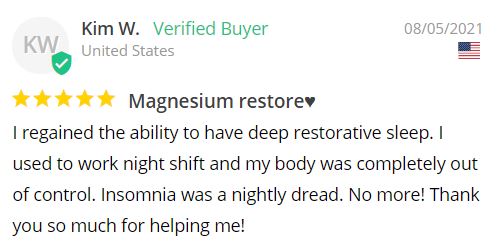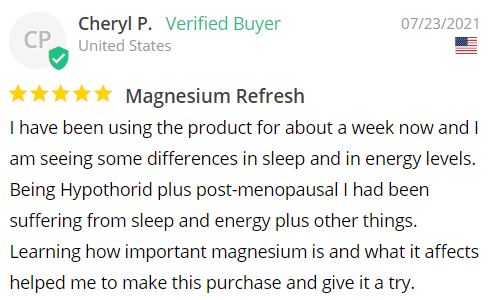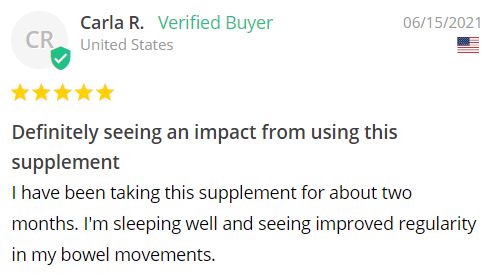
Magnesium is one of those supplements that virtually every woman can benefit from, but I also get TONS of questions about it!
“When do I take it?”, “What kind is best?”, “Does it cause any side effects?” and many other questions may be holding you back from trying something that could really transform how you feel right now.
My hope is that after reading this article, you’ll get your biggest questions answered so you’re ready to take this great step toward happier hormones, better sleep, improved energy levels, and so much more!
Estimates show that up to 50% of women (and maybe more) are deficient in magnesium at some level. But since it’s such a hard deficiency to test for (it doesn’t show up in normal blood work), many of us go through life not knowing that a simple supplement could make such a profound impact on our health!
Some of the biggest indicators that your magnesium levels are low include:
- Being super irritable, restless, and anxious
- Headaches and migraines
- Hypertension
- Muscle cramps or spasms
- Lack of energy, even to the point of chronic fatigue
- Insomnia, trouble sleeping, or inability to wind down
Symptoms of magnesium deficiency may be subtle…. it’s not something that’s going to hit you as something obvious and blatant, but if you are deficient, you will notice a difference very quickly once you start supplementing!
So let’s get to it!
Here are some common magnesium FAQs so you can get the answers you need:
What Is the Best Magnesium Dosage and When Should I Take It?
I recommend taking 300-600mg each night about 30-60 minutes before bed, as magnesium is great for helping your body relax. You can experiment with the dosage within this range until you find what your body responds best too!
I Take a Multivitamin; Do I Need to Take More Magnesium?
Yes. The reason is that a multi has a hard time providing the full amount of certain vitamins and minerals, especially for magnesium and B vitamins. Magnesium tends to be bulky, and the ideal daily amount simply will not fit into a multivitamin.
Additionally, women (especially in perimenopause and menopause) tend to burn through these nutrients faster and require higher levels of these to feel their best, and it just can’t all come through one multivitamin.
You can get my Women’s Daily Essentials bundle HERE with my Magnesium Restore and Activated B Complete for 10% off today! >>
Can I Take This at the Same Time as Hormone Balance, Since Hormone Balance Also Includes Magnesium
Great question: yes! It is fine to take both supplements at once.
The majority of people are deficient in magnesium, so getting more is typically a good thing, and the amount in Hormone Balance is quite small. If your body is getting too much magnesium, the symptom to watch for would be loose stools. And then you would just reduce the dosage a bit to find the best balance for your unique body.
Do I Need to Take Magnesium If I Already Take a Probiotic?
Probiotics are essential for gut health, and I personally take both a high-quality probiotic AND magnesium every day.
Magnesium and probiotics work very differently in the ways they support gut health, but they do support each other when you take both. For example, probiotics improve how your gut is able to absorb nutrients. This means you’ll get more bang out of your magnesium supplement. And magnesium helps create an ideal environment for gut bacteria, which will help improve the effects of your probiotic.
Magnesium does help with bowel motility, so upping your magnesium is another great tool to keep things moving as they should!
There Are So Many Different Types of Magnesium That I Get Overwhelmed. What Do You Recommend?
The truth is that there are a lot of junk magnesium supplements out there that won’t even absorb into your body. And there are kinds that may deliver some benefits, but they don’t really optimize your body’s magnesium levels like you really want them to.
That’s why I recommend a combo of magnesium bis-glycinate chelate and magnesium oxide for maximum absorption into your body. These two together work to both quickly deliver magnesium when you need it (to help with bowel health, relaxation, sleep, energy, etc.) and also sustainably raise your body’s magnesium levels to correct deficiencies and optimize long-term health.
This is the blend that I carry in Magnesium Restore—and the results speak for themselves! This is a combo that really works for your needs. Get it here today! >>
The other type I recommend is much more targeted: Magnesium Citrate is great for when you need some quick poop support! I usually take this with me when I travel or if I know that my food choices are going to vary from what I normally eat. It’s not great for daily support, but it can be helpful to keep things moving like they need to.
Does Magnesium Cause Indigestion, Headaches, or Other Side Effects?
Side effects with this type of magnesium are rare, but if you struggle with digestive motility, there is a chance that taking a full dosage to start off with could “loosen up” too much at once and cause some upset. The power magnesium has to help your body detoxify can also cause headaches in some people (but it’s a sign that it’s working!).
So if you feel that your magnesium is causing any of these things in your case, cut back to a lower dose and build up to a full recommended 300-600mg. This would mean taking only one capsule per night, or even one every other night, while your body adjusts.
This is not a common reaction, but if you do experience any of these symptoms, this is actually a sign that your body is in desperate need of magnesium. As you continue to take it, symptoms should go away!
Can Magnesium Make it Hard to Sleep?
Normally, magnesium contributes to restful sleep. It’s a relaxant that can help your mind and body unwind and rest so you sleep MORE soundly than you would without it.
However, in some rare cases, I’ve heard people say that it makes them more restless at night. Your body still needs magnesium, so if this happens for you just take it in the morning or more than 3 hours before bed.
Is Magnesium Good for MTHFR?
Yes, the magnesium that I recommend is designed to be absorbable, so it is a great choice for those with MTHFR gene mutations. In fact, people with MTHFR typically need even more magnesium than those without it.
If you have MTHFR, I recommend taking both Magnesium Restore and Activated B Complete because they are both prime choices to be used immediately in your body without requiring methylation (which is what MTHFR prohibits).
Get these bundled together for 10% off here! >>
Does Magnesium Help With Restless Leg Syndrome?
Yes, magnesium is known for helping with restless leg issues and much more! It works within your muscle cells to support relaxation, especially when you take it at night before bed.
Get the Highest-Quality Magnesium Today
Magnesium Restore differs from other supplements you find because it has been tested and proven effective for thousands of women. Check out some of these stories:
Take the first step towards relieving your symptoms, restoring balance to your hormones, and enhancing your sleep & energy with Magnesium Restore today!
You can also get 10% off Magnesium Restore when you buy a discounted 3-pack HERE >>>
Get Your Magnesium Here >>>





Can men take your magnesium ? A friend and her husband are looking for a good magnesium
Thanks
Sandy
Hi Sandy! Yes, absolutely – men and women both benefit from taking magnesium!